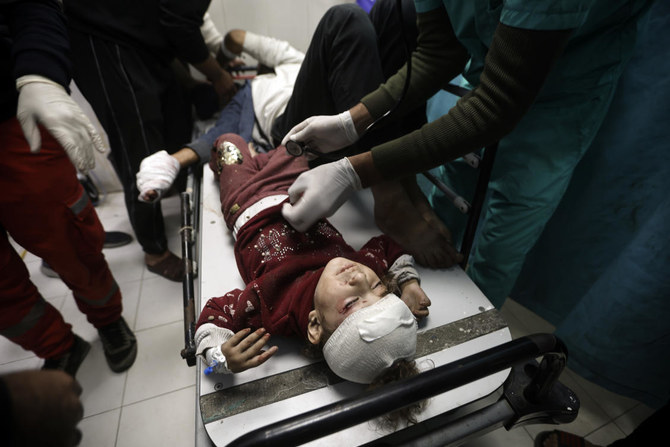CAIRO: Israel launched fresh airstrikes on Tuesday against central Gaza, where the United Nations voiced alarm over an escalation of attacks that have killed more than 100 Palestinians over two days in one part of the enclave.
The war intensified around Christmas, particularly in a central area just south of the seasonal waterway that bisects the Gaza Strip. The Israeli army told civilians to leave the area, though many said there was no safe place left to go.
“We are gravely concerned about the continued bombardment of Middle Gaza by Israeli forces, which has claimed more than 100 Palestinian lives since Christmas Eve,” said UN Human Rights Office spokesperson Seif Magango.
“Israeli forces must take all measures available to protect civilians. Warnings and evacuation orders do not absolve them of the full range of their international humanitarian law obligations.”
Israel is determined to destroy Hamas despite global calls for a cease-fire in the 11-week-old war and new concerns the conflict could spread with US and Iran-aligned forces attacking each other elsewhere in the region.
Palestinian health authorities said nearly 21,000 people in Gaza had been killed in Israeli strikes since Oct. 7, with thousands more feared buried under rubble. Nearly all of the enclave’s 2.3 million people have been driven from their homes, many several times.
Israel says it is doing what it can to protect civilians, and blames Hamas for putting them in harm’s way by operating among them, which Hamas denies. But even Israel’s closest ally the United States has said it should do more to reduce civilian deaths from what President Joe Biden has called “indiscriminate bombing.”
’NO MAGIC SOLUTIONS’
Israel’s Chief of the General Staff Herzi Halevi told reporters in a televised statement on the Gaza border that the war would go on “for many months.”
“There are no magic solutions, there are no shortcuts in dismantling a terrorist organization, only determined and persistent fighting,” Halevi said. “We will reach Hamas’ leadership too, whether it takes a week or if it takes months.”
Since a truce collapsed at the start of December, Israel has extended its ground campaign from the northern half of Gaza to encompass the entire enclave.
In recent days, fighting in the north has remained as intense as ever, even as southern and central areas now holding hundreds of thousands of displaced civilians have become war zones.
At Nasser Hospital in Khan Younis, the largest medical facility in the southern Gaza Strip, medics said 10 Palestinians had been killed in two separate Israeli airstrikes.
“There were displaced people and residents inside the house, more than 20 people, children and women. We managed to rescue some children, but the rest were martyred,” said Khan Younis resident Salah Shaat, describing the aftermath of an airstrike at sunset on Monday.
Washington has openly pressed Israel in recent weeks to scale down its Gaza war from a full-blown military assault to a more targeted operation of raids on Hamas leaders. Israel says it will not stop fighting until Hamas is completely destroyed.
Netanyahu hammered that point on Monday at a meeting with lawmakers after visiting troops in Gaza.
“We are not stopping. The war will continue until the end, until we finish it, no less,” he said.
Netanyahu adviser Mark Regev told CNN on Tuesday that destroying Hamas, which has ruled Gaza since 2007, was “a prerequisite for a better future both for Israelis and Palestinians.”
“You won’t have a demilitarized and deradicalized Gaza without first destroying Hamas. You can’t have reconstruction in Gaza, rebuilding the lives of people without first getting rid of Hamas.”
Elsewhere in the region, US forces have come under attack by Iran-backed militants in Iraq and Syria over Washington’s backing of Israel.
The US military carried out retaliatory airstrikes on Monday in Iraq after a drone attack by Iran-aligned militants on a US base in Irbil left one US service member in critical condition and wounded two.
The airstrikes killed “a number of Kataib Hezbollah militants” and destroyed multiple facilities used by the group, the US military said.
There were reports of new explosions near shipping off the coast of Yemen, where the Iran-aligned Houthi movement has attacked ships it says have links to Israel in the entrance to the Red Sea, one of the world’s busiest shipping lanes.
On Monday an Israeli airstrike killed a senior leader of Iran’s Revolutionary Guards in Syria.
On the Lebanon border, Israel said on Tuesday that nine Israeli soldiers and one civilian had been injured by anti-tank missiles fired from Lebanon toward a church, drawing retaliatory airstrikes against Hezbollah targets.
“We are in a multi-front war and are coming under attack from seven theaters: Gaza, Lebanon, Syria, Judea and Samaria (the West Bank), Iraq, Yemen and Iran,” Israeli Defense Minister Yoav Gallant told lawmakers, listing six places where Iran-backed militants are active, as well as Iran itself.
“We have already responded and taken action in six of these theaters,” he said, without specifying the one that had yet to see Israeli action.
In India, there was an explosion near the Israeli embassy in New Delhi. Authorities said no staff were hurt.














